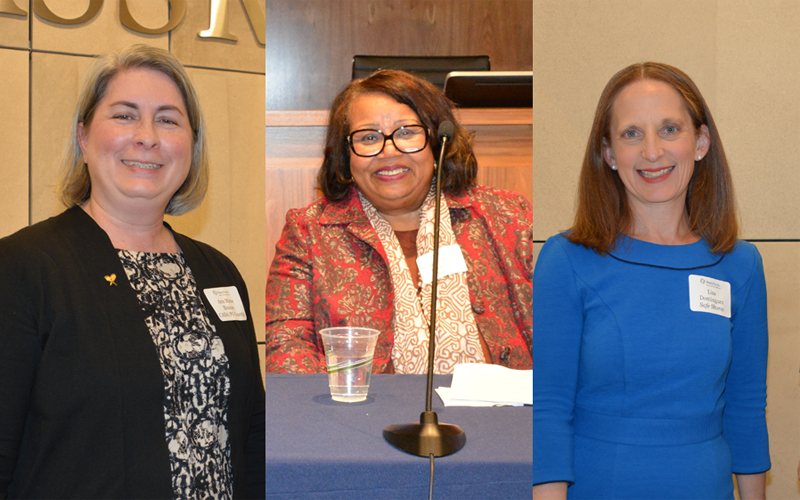“What do you do with a two-year-old who’s already had three mothers?”
That question was posed by Dr. Sheryl Brissett Chapman at the recent Many Hands forum on children in foster care. Dr. Chapman, executive director of The National Center for Children and Families, was one of three experts who took part in a thought-provoking discussion of the challenges faced by foster parents and children in care. The panel was moderated by Board member and documentary producer Jill Rosenbaum Meyer.
Dr. Chapman, whose organization provides services for hundreds of Washington, DC children in foster care, gave Many Hands members and guests a vivid picture of the emotional cost to those children. “The pain of the hurt they’ve suffered–they expect to be hurt again,” she said. “My job is to dump the trauma, so that the kids can see a future that belongs to them.”
Thirty years ago, Washington, DC was sued for failing to protect its children in foster care, and the system was taken over by a Federal court. Since then, much has improved; half as many kids are in foster care today as a decade ago. But there is a cost: the children in the system are the most damaged, reflecting the troubled lives of their parents.
“The thread that holds true over the last 20 years is parental substance abuse and mental illness,” said Lisa Dominguez, who directs clinical services at Safe Shores, the 2017 recipient of the Many Hands $100,000 Impact Grant. “We also see a lot of intergenerational trauma–parents who were raised in foster care themselves and were victims of abuse and neglect. When you are struggling with being able to take care of yourself, it’s hard to take care of someone else.”
Dominguez explained that a consistent sign of the damage done to kids is the inability to form attachment to adults: “The basics of attachment are: you’re a baby, you cry, and your needs get met. That’s how we learn adults are people who help us, that the world is a safe place. When that doesn’t happen, it has long lasting effects on how kids see the world.”
Dominguez also said it is a myth that trauma experienced by very young children has little impact. “When I hear, ‘They were so little they don’t remember,’ I push back on that because pre-verbal trauma can be dangerous to children,” she said. “Kids do remember.”
Ann Marie Binsner, executive director of CASA/Prince George’s County, a 2019 Many Hands Partner Grantee, asked the audience to consider the difficulties young adults face when aging out of the foster care system at the age 18 or 21.
“Take a minute and think about the greatest young person you know…maybe your own child,” she challenged the audience. “Now imagine that same young person and take away all the supports. No one to make sure they achieved those major and minor milestones. Goals and dreams are never even set. Then they turn 21 and are emancipated, on their own.”
Binsner’s organization provides long-term volunteer advocates for children in care and helps to prepare them for life beyond the system. “Preparing youth for adulthood cannot be taught in a few classes,” she observed. “In our own lives, it takes adults modeling behavior that prepares them. The same supports are needed by the kids in foster care. The child welfare system doesn’t operate that way. So supplying someone who can do that [like a CASA volunteer] is what makes the difference.”
Dr. Chapman’s organization recruits foster parents, and she was candid about the challenges a foster parent faces. “How many of you have raised a teenager?” she asked the Many Hands audience. “I’ve raised five. These kids have all the normal developmental issues any teen has; that’s how you grow up. Parents have to set limits, but not dominate.” The challenge faced by her organization and the child welfare system as a whole is to recruit caregivers to “do that for children who belong to another mother or father. There are plenty of folks who don’t want to do that for their own children.” Dr. Chapman noted that recruiting foster parents is difficult and cited one study that showed that for every 10 parents an organization approaches, one signs on. “We’ve had 60 new foster homes licensed in the last two years, but we’ve also lost 45,” she said.
Panel members were asked about their reaction to the Family First Prevention Services Act, signed into law in 2018, that stresses preserving and supporting birth families to avoid children going into foster care. All three panelists supported the initiative, believing children do best in their birth families if they can be kept safe. But all three also had reservations.
Chapman, who herself adopted three children of relatives, said that 35 percent of the foster parents she recruits are relatives of the children and she would like to see most children being cared for by kin. Ann Marie Binsner of CASA welcomes the initiative, as it would allow CASA to deploy resources in a child’s home that are now restricted to foster care; however, she is worried about how open to change the child welfare system really is.
Safe Shores’ Lisa Dominguez supports the family preservation model but warns that it won’t be effective unless the resources are there for the long term: “You don’t walk into a family, provide six months of services and walk away. If you really want to keep families together you need to walk hand in hand with them for a long time.”
* * * * *
“Children in Foster Care: Challenges Today and in the Future” – A Many Hands Panel Discussion
Tuesday, November 5, 2019
The Washington College of Law at American University
Reporting by Many Hands member Kathy Slobogin


